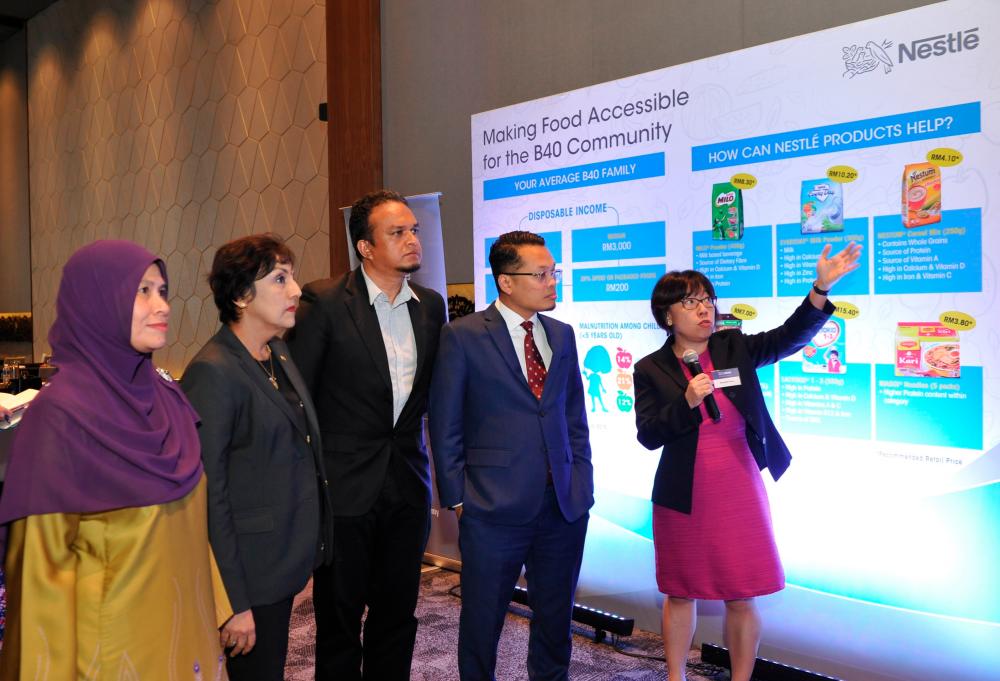Driving a robust dialogue on improving nutritional intake amongst the urban poor, Nestle Malaysia recently brought together key stakeholders across government, academia and non-governmental organisations to cast a light on this topic and discuss potential solutions.
There is an evident need to address this issue, as nutrient deficiencies such as malnutrition and obesity are prevalent in Malaysia’s B40 community. While there are various underlying factors, the Urban Child Poverty and Deprivation study by the United Nation’s Children’s Fund (UNICEF) indicates that approximately 97% of Program Perumahan Rakyat (PPR) households consider affordability of food products to be one of the key barriers in obtaining balanced meals.
To this end, the dialogue session was aimed at sharing diverse, relevant perspectives on the impact of insufficient nutrition amongst the urban poor and how this barrier can be overcome, in line with the theme, Happier & Healthier Families – Making Eating Well Accessible for the B40 Community.
Nik Nazmi Nik Ahmad, Member of Parliament for Setiawangsa graced the event as keynote speaker. Present as panellists were Professor Dr Zalilah Mohd Shariff, lecturer at department of nutrition and dietetics, University Putra Malaysia, Muhammad Kamarulazizi, founder of Kindness Malaysia and Nirmalah Thurai, executive director, group corporate affairs, Nestle Malaysia.
Nik Nazmi commented, “The growing prevalence of malnutrition and obesity in Malaysia is indeed concerning. In fact, malnutrition for children in the B40 community fares worse than the national average. In PPR flats, it is reported that 15% of children are underweight, while 22% are stunted and 20% are wasting. This is certainly a timely discussion spearheaded by Nestle to collectively tackle this issue, and is well aligned with the government’s aim to uplift the status of lower income groups as part of the Shared Prosperity Vision.”
Nirmalah said, “For over 100 years, Nestle has nurtured generations of Malaysians and we strongly support the government’s aspirations in creating a healthier Malaysia. Our commitment to nutrition is reflected in our efforts to reduce sugar and sodium and towards ensuring micronutrient fortification in our products, on top of our various programmes to encourage healthier lifestyles. We continue to work hard to ensure that we are able to provide tasty and also nutritious high-quality products at affordable prices to all Malaysians, including to the B40 community.”
“The food and beverages industry too has an important role to play and efforts in micro and macronutrient fortification of products is key in fighting silent hunger and stunting and wasting issues,” she added.
Among the key insights shared during the dialogue was the fact that the lack of proper nutrients and minerals during crucial periods such as pregnancy, infancy and early childhood could lead to nutrient deficiencies, specifically malnutrition. Malnutrition, if not addressed early on, could have lasting effects in a child’s life, impacting their development as well as potentially causing obesity, diabetes and other non-communicable diseases. Not addressing this could subsequently have a multiplier effect, in which generations of families remain undernourished.
It was also understood that the main concern for the B40 community when it comes to food, is the importance of consuming a meal which allows them to be full for longer. In most cases, the staple is always rice, along with some gravy and sometimes a side dish of eggs. While there also is a lack of awareness, consuming a healthy and nutritious meal is not necessarily a priority for the urban poor.
“We are conscious of the challenges faced by the urban poor, which has resulted in nutrient deficiencies in these communities, and that resolving this complex issue requires collaboration from all parties. It is our hope that by driving the conversation together with relevant stakeholders at today’s dialogue session, we will be able to ring about meaningful and impactful change on a larger scale, to improve nutritional intake and ultimately help nurture a healthier Malaysia,” concluded Nirmalah.













